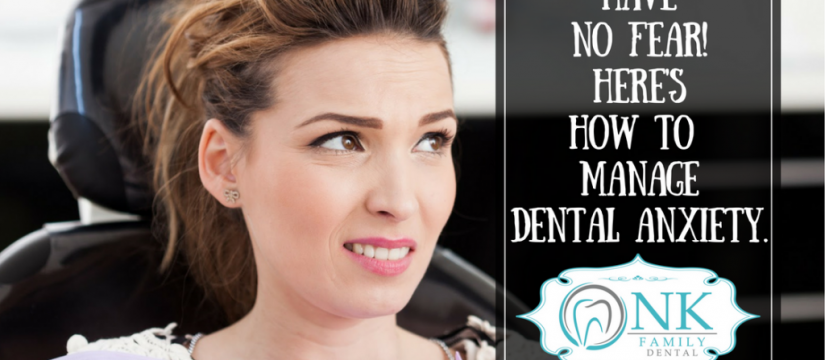
Many people get a little nervous about seeing the dentist. Worry over getting bad news – such as needing a filling, extensive work or an extraction – is to be expected. However, when fear is so overwhelming that you avoid scheduling appointments for even routine six-month checkups, both your oral health and overall health can suffer.
If this describes the feelings you experience, you’re not alone. According to the Columbia University College of Dental Medicine for Colgate, dental anxiety and phobia are extremely common. It is estimated that 9 to 15 percent of Americans – or about 30 to 40 million people – avoid seeing the dentist for this reason.
While the words “anxiety” and “phobia” are often used interchangeably, they have distinctive meanings. Anxiety refers to a sense of uneasiness, with exaggerated or unfounded fears. A phobia is much more serious, characterized by intense fear or panic. There is a spectrum of dental anxiety and phobia. As described in the Colgate article, a person at the extreme of the phobia spectrum may never see a dentist. Others may force themselves to go, but may not sleep the night before – or feel (or become) physically ill while in the waiting room.
Unfortunately, fear about seeing the dentist can create a self-fulfilling prophecy in that the resulting neglect over time will likely lead to conditions requiring intensive treatment and/or loss of teeth. Poor oral health also has a negative effect on general health, having been implicated in such life-threatening conditions as heart disease and lung infections. However, there are steps you can take to alleviate your fears and get the preventive dental treatment you need.
The American Dental Association (ADA) offers the following advice on dental anxiety.
Speak up – Talk to your dentist and dental team about your feelings of anxiety. When you schedule your appointment, let the receptionist know that you’re nervous about dental visits. Remind the dentist and staff about your anxiety when you arrive. Also tell the dentist if you have a low pain threshold, so the level of local anesthetic can be adjusted accordingly. Agree on a hand signal if you need to take a break during the exam or procedure.
Dr. Nilofer Khan, owner and General Dentist at NK Family Dental, focuses on easing the fears of patients dealing with anxiety. She will talk with you about the exam or procedure you have scheduled, and provide a supportive, calming spa-like environment throughout the treatment.
Distract yourself – The ADA recommends bringing headphones to listen to your favorite music or audiobook. NK Family Dental provides movies with headphones to enjoy during treatment.
Use mindfulness techniques – Deep breathing exercises have been proven to help ease anxiety. The ADA recommends the following techniques:
Count your breaths. Inhale slowly and then exhale for the same number of counts. Do this five times while you’re waiting for your appointment, or during breaks while in the dental chair.
Do a “body scan.” Concentrate on relaxing your muscles, one body part at a time. Start with your head, and work your way down to your toes. For example, you can focus on releasing tension starting in your forehead, then your cheeks, neck and down the rest of your body.
Of course, finding a dentist who welcomes and listens to patients dealing with anxiety is an important part of treatment. Too often, such patients have experienced dentists whose overt or subtle attitude has been to “get over it” – which, of course, makes the anxiety level even worse. At NK Family Dental, we take pride in our commitment to make dental treatment a positive experience for everyone. Contact us today to schedule an appointment. We look forward to meeting you and becoming your partner in good oral health!
